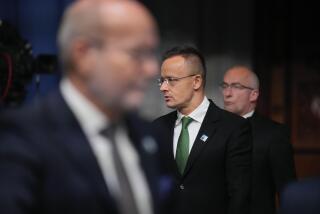European Central Bank tosses hot potato back to governments
The European Central Bank is keeping its benchmark interest rate steady at 1%, handing off the responsibility of righting the struggling Eurozone to its disparate governments.
Mario Draghi, the bank’s president, said Wednesday that although the second quarter will bring weakening growth and “prevailing uncertainty,” the euro area’s economy is expected to “recover gradually.”
Inflation rates will remain above 2% for the rest of the year, Draghi said, but they could fall below that mark early next year. He warned, however, of “increased downside risks to the economic outlook.”
So instead of edging toward a spirit of stimulus as some had hoped it would, helping to lower borrowing costs for Europe’s fretting businesses and governments, the bank kept its big guns holstered.
But not for long, potentially. Some of the bank’s council members had wanted to cut rates immediately, Draghi said, leading many to speculate that such an action is inevitable.
Draghi himself said the bank “will monitor further developments closely and ensure medium-term price stability for the euro area by acting in a firm and timely manner.”
But for now, the onus is back on Germany’s Angel Merkel and the European Commission to figure out how to deal with Spain – which may require international aid to rescue its banking system – and Greece – which may ditch the euro after its elections next weekend.
Instability in either country could tamper with economic stability in the rest of Europe, as well as in Asia and the U.S.
Draghi said the bank “very much welcomes … reflections on the long-term vision for economic and monetary union” from the commission, whose president, Jose Manuel Barroso, last week called for a multi-national banking collective.
“It is of crucial importance to continue with the efforts to restore sound fiscal positions and to regain competitiveness,” Draghi said. “These are pre-conditions for stable economic growth.… In several euro area countries, excessive imbalances exist and need to be corrected.”
The European Commission, the EU’s executive body, announced a new plan Wednesday to create common rules for dealing with troubled banks.
The proposal would make taxpayer-funded bailouts unnecessary, instead shifting the burden of restructuring costs to a bank’s shareholders, creditors and employees. Public authorities would be allowed to intervene earlier and take over failing banks if necessary.
“The global financial crisis has demonstrated that a problem with one bank can quickly spread to the rest of the economy and to other countries,” the commission said in a statement. “It has also become clear that EU countries don’t have the right rules in place to properly manage failing banks.”
RELATED:
Euro near a 2-year low; EU calls for a ‘banking union’
G7 will ‘monitor’ Eurozone situation; Spain issues plea for help
George Soros predicts euro will survive but that ‘German empire’ looms
Follow Tiffany Hsu on Twitter and Google+
More to Read
Inside the business of entertainment
The Wide Shot brings you news, analysis and insights on everything from streaming wars to production — and what it all means for the future.
You may occasionally receive promotional content from the Los Angeles Times.











